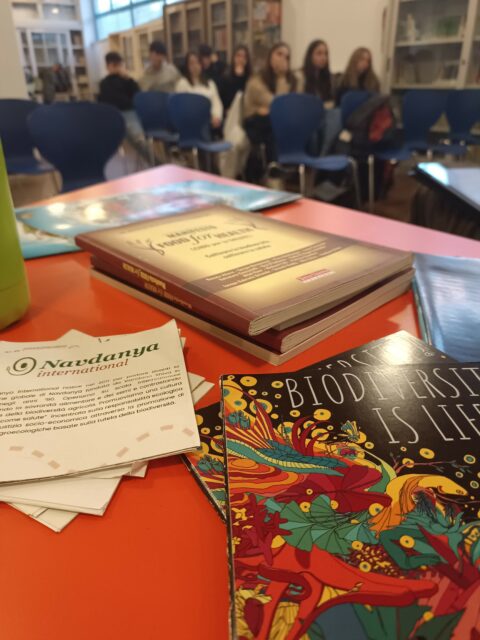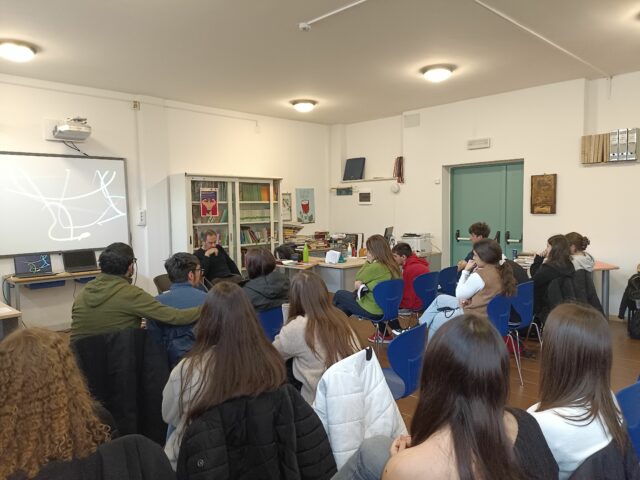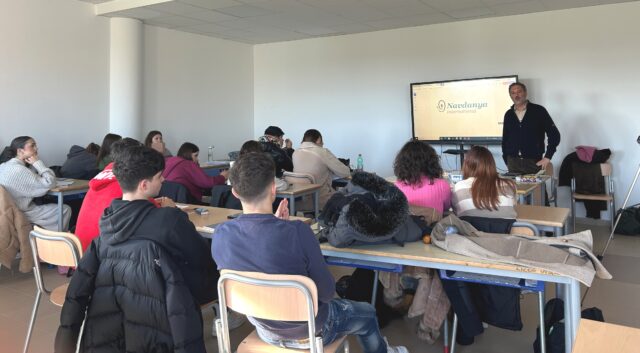On January 28 and 29, the ecological education program began for students enrolled in the Pathway for Transversal Skills and Orientation (PCTO) at Liceo Ignazio Vian in Bracciano and Anguillara. This marks the launch of the first training course under Terrae Vivae, the School of Diffused Agroecology, promoted by Navdanya International with the support of the Ecology Agenda of the Italian Buddhist Union.
The program engages 49 students in a 30-hour training experience, equipping them with tools to analyze local ecosystems and understand ecological dynamics. Through this course, students develop a deeper awareness of agroecological systems and their essential role in environmental sustainability.
Also read: Terrae Vivae: ecological communities in transition,
By Manlio Masucci – Navdanya International –
GATE, Il portale dell’Unione Buddhista Italiana | Source
The introductory workshop: mapping the territory to understand it
During the first meeting, students were guided through a participatory mapping exercise aimed at identifying the most significant places in their territory, connections with natural elements and ongoing environmental changes. The focus was particularly on the Bracciano Lake, analyzing its resources, threats and possible conservation strategies. One student recalled the 2017 water crisis, which she experienced while still a child, and expressed a desire to better understand what happened to the lake in the past in order to imagine what its future might be. Through group discussions and hands-on observation, students explored the deep connections between landscape, biodiversity, and local communities, laying the foundation for meaningful reflection on the actions needed to protect the environment.
From theory to practice: a pathway to ecological awareness
The PCTO program is part of a broader educational framework of Terrae Vivae, designed to nurture ecological consciousness and a deeper connection to the living world. Rooted in both theory and practice, it weaves together classroom learning with immersive, place-based experiences, empowering students with the knowledge and skills to care for and protect their environment.
In the coming sessions, students will explore food sovereignty, biodiversity, and agroecology, engaging with practical, regenerative approaches to sustaining natural resources and strengthening the resilience of local ecosystems.
A project that weaves together Land, Community, and Future
The PCTO program is one of many interconnected pathways within Terrae Vivae, which seeks to engage not only students but also teachers, agri-food producers, and local administrators in a shared journey of ecological learning. The aim is to cultivate a living network of knowledge and practices that nurture more regenerative and conscious ways of producing and living in relationship with the land.
Rooted in active participation and the wisdom of local communities, Terrae Vivae envisions an education that is not confined to theory but flows into meaningful action—one that strengthens the bond between people and place, fostering a deeper sense of stewardship for the earth and future generations.
“Terrae Vivae builds in continuity with the Biodiversity is Life project, funded by the 8×1000 of the Italian Buddhist Union, and in parallel with other initiatives carried out in conjunction with the Ecology Agenda of the Italian Buddhist Union over the past three years. This ambitious effort has involved hundreds of students in educational journeys aimed at promoting full ecological awareness.” (from Terrae Vivae: ecological communities in transition, by Manlio Masucci – Navdanya International, GATE – Il portale dell’Unione Buddhista Italiana).
Next steps
In the coming months, the course will continue with educational and hands-on activities that will allow students to apply the knowledge they have acquired, closely observing the functioning of local ecosystems and experimenting with solutions for their safeguarding.
The PCTO experience at Ignazio Vian High School is the first step toward cultivating a deeper, more interconnected way of learning—one that nurtures young people’s relationship with the land, fosters ecological awareness, and inspires a regenerative approach to sustainability, biodiversity, and the stewardship of natural resources.
Reference:
Ecoculturae – Regenerating Ecological Communities
Ecoculturae is Navdanya International’s educational program that promotes ecological knowledge and agroecology to form resilient communities. Through educational pathways and field experiences, it engages students, teachers and citizens to strengthen the link between biodiversity, culture and food systems, with education rooted in territories and geared toward sustainability.





